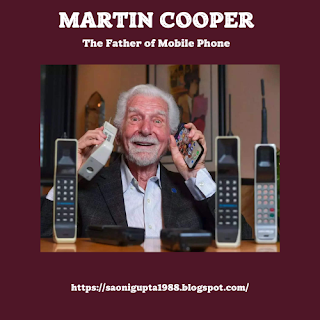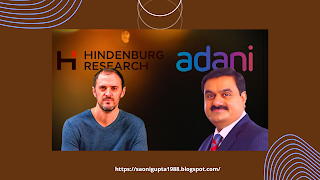A Tribute to Martin Cooper: The Mobile Phone Pioneer
Martin Cooper is an American engineer widely known for his contribution to the invention of the first handheld mobile phone. He is a renowned figure in the field of telecommunications, and his work has revolutionized the way we communicate today. In this blog, I will take a closer look at the life, achievements, and legacy of Martin Cooper.
Early Life and Education
Martin Cooper was born on December 26, 1928, in Chicago, Illinois, and grew up in the city's Beverly neighborhood. His father, Arthur Cooper, was a Ukrainian immigrant who worked as a peddler and later owned a grocery store. His mother, Mary Cooper, was a homemaker of Russian-Jewish descent.
Cooper attended Morgan Park High School in Chicago and was an excellent student. He was interested in science and technology from an early age and spent much of his free time tinkering with electronics.
After high school, Cooper attended the Illinois Institute of Technology (IIT) in Chicago, where he earned a bachelor's degree in electrical engineering in 1950. While at IIT, Cooper was a member of the Navy ROTC and was commissioned as a second lieutenant in the United States Navy upon graduation. Cooper went on to earn a master's degree in electrical engineering from the same institution in 1957.
Career
Martin Cooper began his career in the telecommunications industry in 1954 when he joined the Motorola Corporation in Chicago. He worked as a product development engineer, where he was involved in the design and development of a wide range of communication devices, including two-way radios and pagers.
Cooper quickly rose through the ranks at Motorola and was named director of research and development for the company's mobile communications division in the early 1970s. It was during this time that he began to focus on the development of a portable, handheld mobile phone.
Cooper and his team at Motorola developed the first working prototype of the handheld mobile phone in 1973. The device, which was known as the DynaTAC, weighed nearly two and a half pounds and was about the size of a brick. It had a battery life of around 20 minutes and cost several thousand dollars to produce.
Despite its limitations, the DynaTAC was a groundbreaking achievement, and it paved the way for the development of the mobile phones we use today. The first public demonstration of the DynaTAC took place in New York City in 1973, and it was commercially released in 1983.
Cooper continued to work at Motorola until the late 1980s, serving as the corporate vice president and general manager of the Communications Systems Division. During his tenure at the company, he made significant contributions to the development of wireless broadband and other communication technologies.
Today, Martin Cooper is widely recognized as one of the most influential figures in the telecommunications industry. His work at Motorola and his invention of the handheld mobile phone have had a profound impact on the world we live in today, and his contributions continue to inspire innovation and progress in the field.
Invention and Impact of the Handheld Mobile Phone
The Motorola DynaTAC, which weighed 2.5 pounds, was 9 inches long, and cost $3,995, was the world's first handheld mobile phone. The phone was powered by a rechargeable battery and had a talk time of about 35 minutes. The DynaTAC was not only small and portable but also offered the convenience of being able to make calls from anywhere.
On April 3, 1973, Martin Cooper made the first public call on a handheld mobile phone. He called his rival, Joel Engel, who was working on a similar project at Bell Labs. Cooper's call to Engel lasted just 10 minutes, but it was enough to demonstrate the potential of the handheld mobile phone.
The invention of the handheld mobile phone had a profound impact on the way we communicate. It made communication more accessible and convenient, and it has transformed the way we live and work.
Today, mobile phones are an integral part of our daily lives, and we rely on them for everything from making phone calls and sending messages to accessing the internet and social media. However, without Martin Cooper's vision and hard work, mobile phones may not have become a reality.
Contributions of Martin Cooper
Martin Cooper's contribution to the telecommunications industry goes beyond the invention of the handheld mobile phone. He has also been a vocal advocate for the importance of wireless communication, arguing that it has the potential to improve education, healthcare, and other areas of society. Throughout his career, he has been involved in the development of numerous communication technologies, including wireless broadband, two-way radios, and satellite communications.
After leaving Motorola in the 1980s, Cooper founded a number of companies in the wireless industry, including Cellular Business Systems, ArrayComm, and GreatCall. He has also served as a member of the board of directors for a number of organizations, including the California Institute of Technology and the Museum of Science and Industry in Chicago.
In addition to his work in the telecommunications industry, Martin Cooper is also a philanthropist and has been actively involved in promoting education and entrepreneurship. He is a founding member of the Cooper Union Foundation and has also established the Martin Cooper Entrepreneurial Scholarship Fund, which provides financial support to students pursuing careers in entrepreneurship.
He has written several books on the subject, including "Cutting the Cord: The Cell Phone Has Transformed Humanity" and "The Wireless Internet Opportunity for Developing Countries." Cooper holds multiple patents in the field and has received numerous awards and honors, including induction into the National Inventors Hall of Fame in 2010 and the National Medal of Technology and Innovation in 2013.
Legacy of Martin Cooper
Martin Cooper's legacy in the field of telecommunications is significant. His invention of the handheld mobile phone has transformed the way we communicate and paved the way for further innovation in the field. Today, mobile phones have become an essential part of our lives, and we take for granted the convenience they offer.
Cooper has also been a strong proponent of competition in the telecommunications industry, arguing that it is necessary for innovation and progress. In a 2013 interview with Forbes, he stated, "The only way to have true competition is to have multiple competitors with different ideas trying to innovate".
In recent years, Martin Cooper has continued to be an active voice in the industry. He has spoken out on a number of issues, including the need for improved wireless infrastructure and the importance of innovation in the field.
Cooper spoke with CNBC in 2023 while attending the Mobile World Congress in Barcelona and said that he could not have predicted that phones would become the portable computers they are today. He further claimed that devices would be implanted behind the skin of the ears of future generations. According to Cooper, as the human body is the ideal charger, such devices won't require charging.
In the same interview, Cooper also acknowledged the drawbacks of his innovation, saying that privacy and addiction are both major issues. Today's widespread use of smartphones has given rise to a long list of issues, from social media addiction to privacy invasions.
Conclusion
Martin Cooper is a true visionary whose work has had a profound impact on the way we communicate. His invention of the handheld mobile phone has transformed the world and paved the way for further innovation in the field of telecommunications. As we continue to rely on mobile phones in our daily lives, we should remember the man who made it all possible.







Very nice 👍
ReplyDeleteThank you so much !!! 😊
Delete